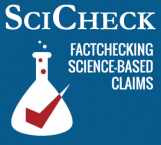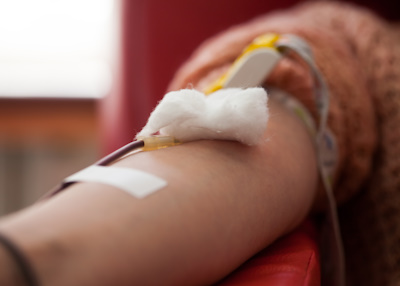SciCheck Digest
People vaccinated with an authorized or approved COVID-19 vaccine can donate blood immediately after receiving a shot if they’re feeling well. Social media posts distort a question from the American Red Cross to baselessly claim the vaccines are unsafe.
Full Story
Nearly two years after related claims about COVID-19 vaccination and blood donation first surfaced, posts on social media are now pointing to a blood donation screening question to falsely suggest the vaccines are unsafe.

Multiple Feb. 20 posts shared a screenshot of a question included in RapidPass, a pre-donation tool the American Red Cross uses to streamline the blood donation process. The question asks if a person has “EVER had a Coronavirus (COVID-19) vaccine.” Those who answer “yes” are told to call the Red Cross “to determine if this will affect” their eligibility to donate. The posts incorrectly imply the question is new and could mean the vaccines are not safe.
“American Red Cross tacitly admits the COVID vaccines are not safe. Finally,” Steve Kirsch, a well-known misinformation spreader, wrote on X, the platform formerly known as Twitter, sharing one such post (emphasis is his).
“COVID Vaxxed May Be Ineligible To Give Blood, Says Red Cross,” conspiracy theorist Alex Jones falsely claimed on X.
A Red Cross spokesperson told us that particular question is not new and has been part of the process “since around the time when COVID vaccines were made available to the public.”
The question is asked to ensure the Red Cross is following advice from the Food and Drug Administration, which recommends a waiting period if someone has received a live attenuated COVID-19 vaccine. Outside of clinical trials, there are no such vaccines, which use live but weakened viruses, currently in use.
In a separate question, the Red Cross RapidPass screening tool asks potential donors if they have received any vaccination in the last eight weeks. Those who answer “yes” are asked to call the Red Cross to determine eligibility, although a note specifically states: “The FLU and COVID-19 vaccine are acceptable as long as you have no symptoms on the day of donation.”
A joint statement issued last year by the Association for the Advancement of Blood & Biotherapies, America’s Blood Centers and the Red Cross in response to similar misinformation explained that blood donations from people “who have received a COVID-19 vaccine approved or authorized for use in the U.S. are safe for transfusion.” As long as people are feeling well, those individuals are eligible to donate blood immediately after receiving a shot.
“[T]here is no scientific evidence that demonstrates adverse outcomes from the transfusions of blood products collected from vaccinated donors and, therefore, no medical reason to distinguish or separate blood donations from individuals who have received a COVID-19 vaccination,” reads the joint statement.

Yet, at least one other social media post is also using the RapidPass question to falsely imply that the Red Cross labels and separates blood depending on vaccination status. An AABB spokesperson told us all blood donations undergo the same safety testing and processing and noted that the FDA recently clarified once again that blood collection facilities such as the Red Cross should not label blood donations based on vaccination status. In a response to AABB, the FDA said that there is “no validated method or test to determine whether a donor received an mRNA vaccine.”
On Feb. 23, the Red Cross reiterated in a news story on its website that “receiving a COVID-19 vaccine does not make you ineligible to donate blood and blood donations from those who have been vaccinated for COVID-19 are safe for transfusion.”
Waiting Period for Blood Donation Common After Live Attenuated Vaccines
The Red Cross and other blood collectors ask potential donors about vaccination history because of the waiting time required after vaccination with some live attenuated vaccines, which contain a live but weakened version of a virus or bacterium that causes disease. This includes, for example, a four-week wait for blood donation following the measles, mumps and rubella, or MMR, vaccine. The AABB explains that is “[b]ecause there is a risk of passing vaccine virus to others” with certain live attenuated vaccines.
As we said, there’s no deferral time for those who received any of the COVID-19 vaccines ever approved or authorized by the FDA — that is, those manufactured by Pfizer/BioNTech, Moderna, Johnson & Johnson or Novavax. But if potential blood donors don’t know which vaccine they received, they’re asked to wait for 14 days after their last shot before they can donate blood. That’s because the FDA advises blood establishments to consider “if it is possible that the individual received a live-attenuated viral vaccine.”
Daniel Parra, a Red Cross spokesperson, told us the question shared in social media is included in RapidPass “to ensure that we are following FDA guidelines to the furthest extent possible.” The only follow-up question a potential vaccinated donor will receive when calling the Red Cross is which vaccine they received, he wrote.
“If it’s one of the FDA-approved vaccines, and the donor is feeling well at the time of the appointment, then they are immediately eligible to donate. If they do not remember the name of the manufacturer, they will be asked to wait two weeks to donate (per FDA guidelines). However, if more than two weeks have passed since their last COVID vaccination, the question is moot,” he wrote in an email.
Currently, there are no live attenuated COVID-19 vaccines authorized or approved by the FDA or by the World Health Organization. But several vaccine candidates that are live attenuated vaccines, most of them nasal sprays, are being evaluated in clinical trials and preclinical studies. By entering the body through the nose or mouth, mucosal vaccines could provide better protection against infection than injected vaccines and more effectively reduce viral transmission.
One of the candidates, CoviLiv, was previously evaluated in a phase 1 clinical trial conducted in the U.K. The vaccine is being assessed in a large phase 3 trial coordinated by the WHO. The developers of the vaccine, the U.S.-based company Codagenix and the Serum Institute of India, hope to submit the vaccine to the FDA for review in 2024.
Editor’s note: SciCheck’s articles providing accurate health information and correcting health misinformation are made possible by a grant from the Robert Wood Johnson Foundation. The foundation has no control over FactCheck.org’s editorial decisions, and the views expressed in our articles do not necessarily reflect the views of the foundation.
Sources
Jaramillo, Catalina. “Red Cross Accepts Blood Donations From People Vaccinated Against COVID-19.” FactCheck.org. 27 Apr 2022.
“Updated Information for Blood Establishments Regarding the COVID-19 Pandemic and Blood Donation.” FDA. 11 Jan 2022.
“Joint Statement: Blood Community Reiterates the Safety of America’s Blood Supply for Patients.” AABB, America’s Blood Centers and American Red Cross. 27 Jan 2023.
“Those Who Receive COVID-19 Vaccine Are Able to Donate Blood.” Red Cross. 23 Feb 2024.
“Eligibility Criteria Alphabetical Listing.” Red Cross. Accessed 29 Feb 2024.
“FAQS About Blood And Blood Donation.” AABB. Accessed 29 Feb 2024.
“COVID-19 Vaccines.” FDA. Accessed 29 Feb 2024.
“COVID-19 Vaccines with WHO Emergency Use Listing.” World Health Organization. Accessed 21 Feb 2024.
“Codagenix Intranasal COVID-19 Vaccine Shows Potent Cellular Immune Response Against Conserved Viral Proteins, Indicating Potential for Immunogenicity Against Omicron and Future Variants in Phase 1 Data.” Codagenix. Press release. 17 Mar 2022.
“Codagenix Announces Late-Breaking Presentation of Positive Clinical Immunogenicity Data For COVID-19 Vaccine Candidate CoviLiv™ at IDWeek 2023.” Codagenix. Press release. 11 Oct 2023.
“Live Attenuated Vaccines for Life-Threatening Respiratory Viruses.” Meissa Vaccines. Accessed 29 Feb 2024.
Jiayu, Xu, et al. “A next-generation intranasal trivalent MMS vaccine induces durable and broad protection against SARS-CoV-2 variants of concern.” Microbiology. 5 Oct 2023.
Bastian, Hilda. “Picking Up Steam: Next Generation Covid Vaccine Update 14.” Absolutely Maybe. 23 Feb 2024.
Willyard, Cassandra. “Needle-free covid vaccines are (still) in the works.” MIT Technology Review. 15 Dec 2023.
Topol, Eric. “Covid Nasal Vaccines Get A Boost.” Ground Truths. 13 Oct 2023.
Bastian, Hilda. “Intranasal & Co: A Very Big Month for Mucosal Covid Vaccines.” Absolutely Maybe. 23 Feb 2024.
McDonald, Jessica. “Posts Falsely Push Bill Gates-Connected ‘Air’ Vaccine Conspiracy.” FactCheck.org. 13 Oct 2023.
Sullivan, Michele G. “Are COVID Nasal Vaccines on the Way?” Health Central. 19 Dec 2023.
“Updated Information for Blood Establishments Regarding the COVID-19 Pandemic and Blood Donation.” FDA. 19 Jan 2021.
Lewis, Jay. Director of marketing and communications, Association for the Advancement of Blood & Biotherapies. Email to FactCheck.org. 26 Feb 2024.
Parra, Daniel. Media relations lead, American Red Cross. Email to FactCheck.org. 23 Feb 2024.